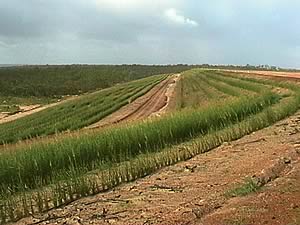 |
|||||||||
|
|||||||||||||||||||
|
|
Bacteria Manage Perfume Oil Production from Vetiver Grass 31/10/08 Scientists in Italy have found bacteria in the root of a tropical grass whose oils have been used in the cosmetic and perfumery industries.
These bacteria seem to promote the production of essential oils, but also they change the molecular structure of the oil, giving it different flavours and properties: termicidal, insecticidal, antimicrobial and antioxidant. Studying the root of the tropical Vetiver grass through interdisciplinary research, the microbiologists Pietro Alifano and Luigi Del Giudice, the plant biologist Massimo Maffei and their colleagues found that Vetiver root cells produce a few oil precursors, which are then metabolised by the root bacteria to build up the complexity of the Vetiver oil. The bacteria were found in the oil-producing cells as well as in root locations that are closely associated with the essential oil. The Vetiver grass is the only grass cultivated specifically for its root essential oil, which is made up of chemicals called sesquiterpenes. These are used in plants as pheromones and juvenile hormones. The essential oils also contain alcohols and hydrocarbons, which, together with the sesquiterpenes are primarily used in perfumery and cosmetics. The perfumery and flavouring industry could benefit from the increased variety that these bacteria provide to the smells and tastes of these oils. The bacteria responsible for this transformation include alpha-, beta- and gamma-proteobacteria, high-G+C Gram-positive bacteria as well as microbes which belong to the Fibrobacteres / Acidobacteria group. "This research opens new frontiers in the biotech arena of natural bioactive compounds" said Professor Alifano "Pharmaceutical, perfumery and flavouring industries may now exploit the selected microbial strains and widen their metabolic libraries". "The ecological role of plant-microbial associations shows another fascinating aspect" said Professor Maffei "The metabolic interplay between a plant, which offers a few simple molecules, with root bacteria, that biotransform them into an array of bioactive compounds, increases fitness and reveals new cost-efficient survival strategies"
|
||||||||||||||||||

|
|
||||||||||||||||||
| home | agri-services | pedigree
pen | news | dairy | beef | machinery BPS | property | organisations | site map |
|||||||||||||||||||


